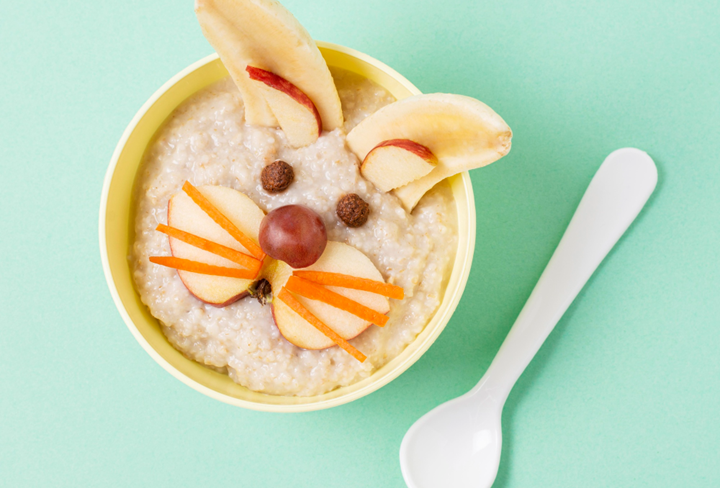Around the age of 6 months, an infant’s need for energy and nutrients starts to exceed what is provided by breast milk, and complementary foods are necessary to meet those needs. An infant of this age is also developmentally ready for other foods. If complementary foods are not introduced around the age of 6 months or are given inappropriately, an infant’s growth may falter. Guiding principles for appropriate complementary feeding are:
- Continue frequent, on-demand breastfeeding until 2 years of age or beyond
- Practice responsive feeding (for example, feed infants directly and assist older children. Feed slowly and patiently, encourage them to eat but do not force them, talk to the child and maintain eye contact)
- Practice good hygiene and proper food handling
- Start at 6 months with small amounts of food and increase gradually as the child gets older
- Gradually increase food consistency and variety
- Increase the number of times that the child is fed: 2–3 meals per day for infants 6–8 months of age and 3–4 meals per day for infants 9–23 months of age, with 1–2 additional snacks as required
- Use fortified complementary foods or vitamin-mineral supplements as needed; and
- During illness, increase fluid intake, including more breastfeeding, and offer soft, favourite food

Make sure your baby is able to sit up in a high chair with his or her head up before starting solid foods.
6 months
- White rice powder porridge
- Mashed rice with ghee
- Ragi porridge
- Raw banana powder porridge
- Cooked &pureed potato, Sweet potato, carrots, pumpkin
- Steamed Banana
- Stewed apple
- Rice water
- Moong dhal water
8 months
- Mashed curd rice, paneer
- Mashed idly
- Mashed rice with dhal & spinach
- Dhal Kichidi, Oats kichidi, oats porridge
- Veg Soups
- Papaya, mango, tomato
- Peas, beans, cauliflower
- Lentils, Spinach
- Yogurt
- Egg yolk, Chicken
11-12 months
- Dahlia kichidi / Oats with veg /Set Dosa /Veg upma
TIPS
- Weaning food should start with a single grain
- Always follow 3 days – wait- rule to check food allergies
- Must be soft, properly cooked & easy to chew
- Start with small quality
- Feed freshly cooked food
Best Foods for a 6-Month-Old Baby
Some healthy food options for 6 months+ babies include:
- Fruits Puree: Fruits should be steamed, mashed, or pureed while introduced for the first time. Fruits like apples, bananas, pears, avocados, chikoo , and peaches can be given.
- Vegetable Puree: Vegetables such sweet potatoes, potatoes, carrots, sweet pumpkin, french beans, etc. can be steamed and given either as finger foods or as a puree.
- Pulses Soup: A variety of pulses, especially dals, can be boiled with water, and the soup can be given to babies.
- Rice Porridge: Rice is a good source of carbohydrates and vitamins for babies. Broken rice, made with breast milk or formula milk, can be given as porridge.
- Cereal Porridge: Porridge can also be made from a variety of single grain cereals like wheat, millet, barley, oats, etc. These cereals can be dried and powdered together or separately to make gruel.
- Vegetable Soup: A variety of vegetables can be boiled in water, and the stock can be given as soup.
- Yoghurt: Although cow’s milk is not recommended until age one, unsweetened yoghurt can be given in moderate amounts as an alternative to purees.
Foods To Avoid For 6 month old
- Cow’s milk
- Dairy products
- Honey
- Salt
- Fruit juices
- Unpasteurized products
- Smoked & cured meats
- High mercury fish
- Caffeinated things such as chocolate
What If Your Baby Is Allergic to Particular Foods?
An allergic reaction can occur in the form of diarrhoea, vomiting, rashes, constipation or pain in the stomach and is a cause for concern. If there is an allergic reaction, stop the food that you have been giving the baby immediately. If the allergic reaction persists, seek medical assistance.

